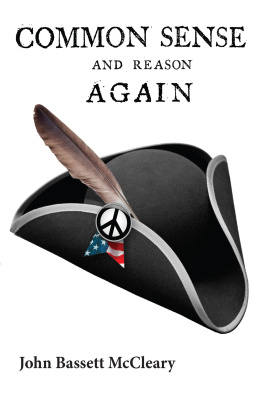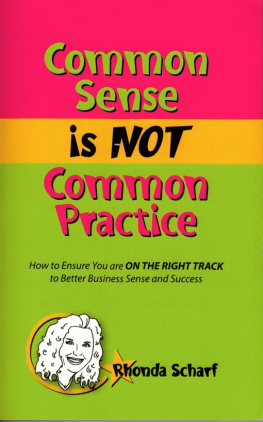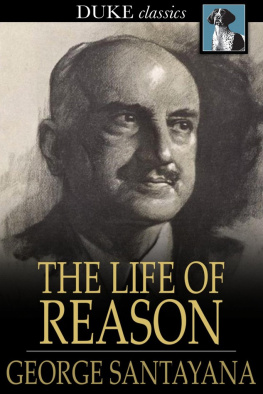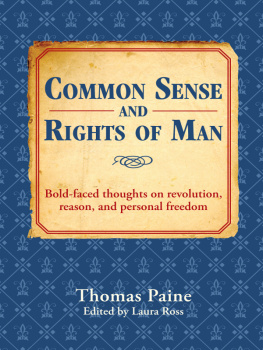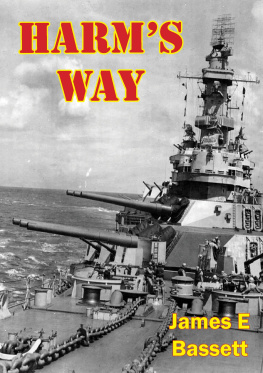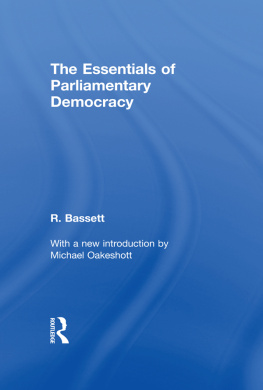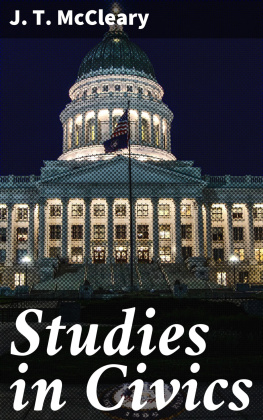COMMON SENSE AND REASON AGAIN
John Bassett McCleary follows a long-time family characteristic of upending the status quo. His grandfather, James Madison Bassett, was the driving force in exposing the corporate fraud of one of the Big Four railroad barons, Collis P. Huntington. And Johns father, W. K. Bassett, initiated the field workers union in Hawaii, providing protection and benefits for the laborers against the fruit canning company owners. John has led the effort of multiple generations to question authority and persons in power.
McClearys writings continue a journalistic tradition, for he is the heir to a family of penmen titansowners, publishers, editors, reporters for the publications The Golden Era, Oakland Tribune, Los Angeles Herald, Oakland Enquirer, San Francisco Chronicle, Pacific Commercial Advertiser , the Honolulu Times, Boston Herald , Providence Bulletin , the magazine Controversy, Pacific Weekly and the Carmel Cymbal .
Douglas Schmitz
Author, historian, Bassett family biographer
Slow Limbo Publishing
ISBN: 0-9668687-3-9
Copyright 2020 John Bassett McCleary
Copyright 2003/2019 John Bassett McCleary
All rights reserved. No part of this book may be reproduced in any form, except brief excerpts for the purpose of review, without written permission of the author and publisher.
Other books by John Bassett McCleary
The Peoples Book
Celestial Arts, 1972
Monterey Peninsula People
ISBN 0-9668687-0-6
Slow Limbo Productions, 1998
The Hippie Dictionary
ISBN 1-58008-355-2
Ten Speed Press, Crown Press/Random House, 2002 revised 2004
Mothers Heart, Fathers Mind
ISBN 0-9668687-4-6
For more information about this book or John McClearys other works, please see: hippiedictionary.com or commonsenseagain.net
Common Sense and Reason Again is the second book in The Hippie Trilogy :
The Hippie Dictionary
Common Sense and Reason Again
Mothers Heart, Fathers Mind
Dedicated To
The people who have spoken out unheard.
Those who are afraid to speak out.
And to
John and Richard Miller, who spoke out all their lives
and demanded to be heard;
you know which Millers you are among all the Millers!
With guidance from Thomas Paine
IntroductionThomas Paine
Common Sense [1776]
In the following pages I offer nothing more than simple facts, plain arguments, and common sense; and have no other preliminaries to settle with the reader, than that he will divest himself of prejudice and prepossession, and suffer his reason and his feelings to determine for themselves; that he will put on, or rather that he will not put off the true character of a man, and generously enlarge his views beyond the present day.
Introduction
Perhaps the sentiments contained in the following pages, are not yet sufficiently fashionable to procure them general favor; a long habit of not thinking a thing wrong, gives it a superficial appearance of being right, and raises at first a formidable outcry in defense of custom. But tumult soon subsides. Time makes more converts than reason.
As a long and violent abuse of power is generally the means of calling the right of it in question, (and in matters too which might never have been thought of, had not the sufferers been aggravated into the inquiry,) and as the king of England hath undertaken in his own right, to support the parliament in what he calls theirs, and as the good people of this country are grievously oppressed by the combination, they have an undoubted privilege to inquire into the pretensions of both, and equally to reject the usurpations of either.
In the following sheets, the author hath studiously avoided every thing which is personal among ourselves. Compliments as well as censure to individuals make no part thereof. The wise and the worthy need not the triumph of a pamphlet; and those whose sentiments are injudicious or unfriendly, will cease of themselves, unless too much pains is bestowed upon their conversion.
The cause of America is, in a great measure, the cause of all mankind. Many circumstances have, and will arise, which are not local, but universal, and through which the principles of all lovers of mankind are affected, and in the event of which, their affections are interested. The laying a country desolate with fire and sword, declaring war against the natural rights of all mankind, and extirpating the defenders thereof from the face of the earth, is the concern of every man to whom nature hath given the power of feeling; of which class, regardless of party censure, is the
Author [T homas Paine}
Philadelphia, Feb. 14, 1776.
IntroductionJohn McCleary
Common Sense and Reason Again [2020]
There are immoral minorities, but no immoral majorities. Most people are moral and that is why democracy is the best form of government. In order to save our world, we must, at times, be disturbingly frank, painfully truthful.
I want to focus on the male ego, greed and insecurity. These are the reasons for most of the worlds problems.
Our world can be a family, a tribe, town, state or country and then our planet. And our family, tribe, town, state, country and world are not, personally, ours alone. There are other family members and other occupants of our world. We are all just in these groups and places for a while with others. Your country is other peoples world, other peoples family. If you think you are the center of the universe, you are not alone; everyone thinks they are the center of everything. It is only the greedy and arrogant who make a big deal out of it. In order to be a good family member, you must respect the other family members in our world.
Patriotism, nationalism and ethnic pride are important to give us a foundation in our history, but global democracy exists to prepare for and insure for our good future. If you have no living family, children or spouse, you might, I say, might, have a justification for not caring about our environment, peace and freedom, after you die, but I am sure you will not be going to heaven, nirvana or Club Med wherever you think death should take you.
Dont confuse the difference between a revolutionary war and a war of economics and expansion. Dont confuse the difference between a weapon of defense and a weapon of aggression and expansion.
In 1776, Thomas Paines little book, Common Sense , helped usher in a totally new form of government, a democratic and representational form of government whereby the common people were given the opportunity to speak their mind by voting for a representative who would gather with other representatives from the other Colonies to propose, hash out, vote and agree on the laws to govern the then 13 states of the United States of America. His little book was the catalyst that bound together the Colonists of America in 1776 and gave them a voice to speak out against the tyranny of English rule. It was the start of a revolution.






